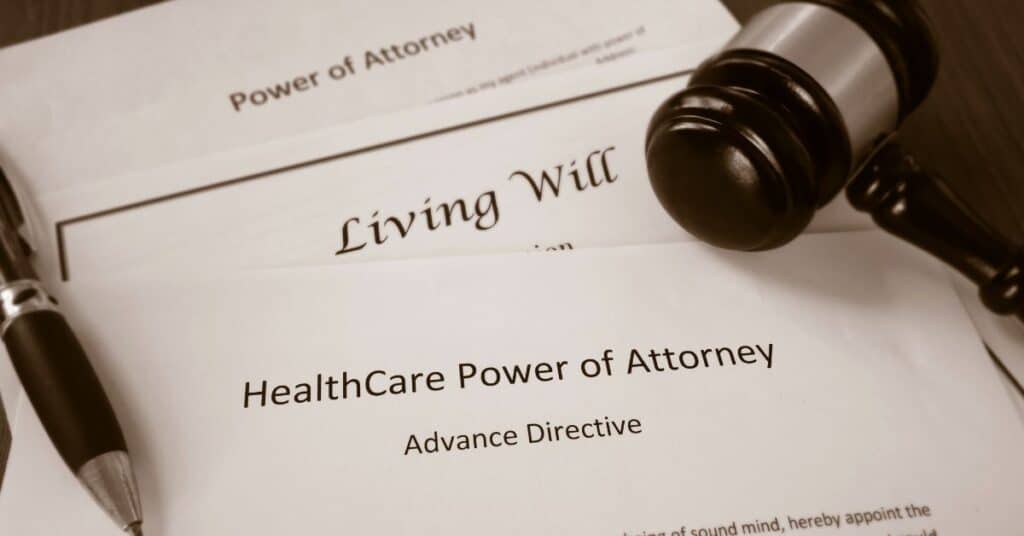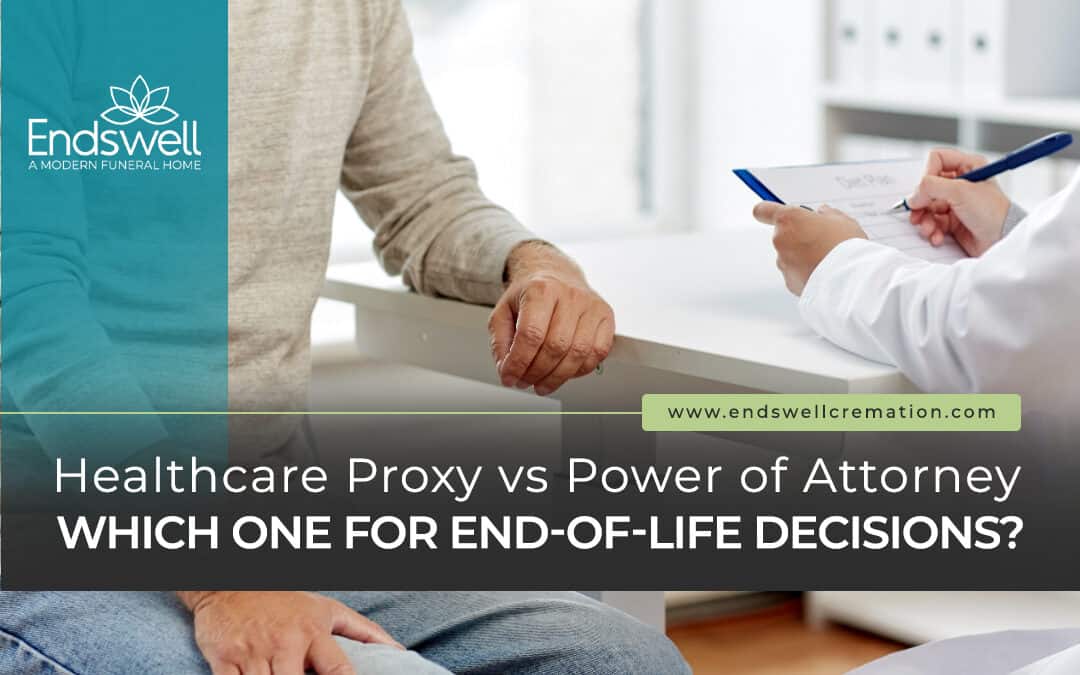When it comes to making important decisions about your healthcare, particularly during the most challenging times, you want to ensure your wishes are clearly understood and respected. That’s where understanding the difference between a healthcare proxy vs. power of attorney becomes crucial.
If you’re wondering which one is the right choice for end-of-life decisions, you’re not alone. Let’s take a closer look at how each one works, so you can make an informed decision for yourself or your loved ones.
Health Care Proxy vs. Healthcare Power Of Attorney in North Carolina
When it comes to making important medical decisions, especially when you’re unable to speak for yourself, North Carolina law provides two key options: a healthcare proxy and a healthcare power of attorney.
Both are legal documents that allow you to appoint someone to make decisions on your behalf, but they each serve different purposes.
Let’s explore these differences in depth to help you decide which one fits best with your end-of-life planning.
Understanding The Healthcare Power Of Attorney
A healthcare power of attorney is a legal document that appoints a trusted person, known as your healthcare agent, to make medical decisions for you when you are incapacitated. In North Carolina, this legal document provides your agent with the authority to make healthcare decisions in accordance with your wishes, especially regarding medical treatments and life-sustaining measures.
However, this power only activates when you are unable to communicate your own decisions, whether temporarily or permanently.
The Durable Power Of Attorney
In North Carolina, the healthcare power of attorney is typically a durable power. This means the authority of your appointed agent remains intact even if you become incapacitated.
Your healthcare agent is responsible for working closely with doctors to ensure that your medical care aligns with your specific instructions, whether it involves life support, surgery, or other medical treatments.

What Is A Health Care Proxy?
A healthcare proxy, in some ways, is similar to a healthcare power of attorney but with key differences. It is a legal document where you appoint someone—often a close friend or family member—to make medical decisions on your behalf if you’re unable to do so.
While a healthcare power of attorney provides broader authority over healthcare decisions, a healthcare proxy generally focuses on specific medical care decisions in certain circumstances.
Key Differences Between The Two
The key difference between a healthcare proxy vs. healthcare power of attorney lies in their scope.
- A healthcare power of attorney typically offers more comprehensive decision-making power, covering a wider range of medical and even some legal responsibilities, like discussing your living will with doctors or managing certain healthcare-related financial decisions.
- In contrast, a healthcare proxy tends to focus specifically on medical decisions, often limiting the power to healthcare matters only, without broader authority over financial or legal issues.
When To Consider Each Option
You may want to choose a healthcare or medical power of attorney if you are looking for a broader range of control over your end-of-life care. The healthcare power allows your agent to have durable power over decisions about life support, medical treatments, and potentially even managing healthcare-related finances.
A healthcare proxy, on the other hand, may be preferable if you are more focused on appointing someone to make decisions about medical care in the hospital or during specific medical treatments.

Our compassionate team at Endsewell is here to answer any questions and help you begin your end-of-life planning. Contact Endswell Funeral Home today at 919-907-9777.
Choosing The Right Agent
Whether you select a healthcare proxy or healthcare power of attorney, it’s crucial to choose a person you trust. This could be a family member, a trusted friend, or even a legal professional.
The person appointed will be responsible for making decisions on your behalf based on your expressed wishes. Make sure to discuss your healthcare decisions in detail with this person before you finalize your estate plan so they fully understand your desires.
Final Thoughts On Health Care Proxy vs. Power Of Attorney
Both a healthcare proxy and a healthcare power of attorney are vital legal documents that protect your wishes in critical situations. While they share some similarities, they differ in scope and responsibility.
It’s essential to consult a legal professional to ensure that the option you choose best aligns with your healthcare needs and estate plan.
Other Legal Documents: Healthcare Directives and Your Living Will
In addition to healthcare proxies and powers of attorney, healthcare directives and living play critical roles in planning for your future medical care. These legal documents give you a voice in decisions about life-sustaining treatments when you’re unable to speak for yourself.
Let’s explore how healthcare directives and living wills can work together to ensure your wishes are followed in different circumstances.
Understanding Healthcare Directives
Healthcare directives are legal documents that outline your preferences for medical care, especially in situations where you are incapacitated. These directives serve as a guide for your healthcare agent or healthcare proxy, making it clear what types of treatments you do or do not want to receive.
In North Carolina, having a healthcare directive in place ensures that your healthcare decisions are respected, even when you’re unable to communicate them yourself.
How A Living Will Works
A living will is a specific type of healthcare directive that focuses on your preferences regarding life-sustaining treatments. This document allows you to specify, in cases where recovery is unlikely and you are permanently incapacitated, whether or not you want to receive treatments such as:
- Mechanical ventilation
- Resuscitation
- Feeding tubes
While your healthcare proxy or agent may make day-to-day medical decisions, your living will serves as the ultimate guide for doctors when life-sustaining treatment is in question.

Durable Power of Attorney And Healthcare Directives
A durable power of attorney often works hand-in-hand with healthcare directives.
While your living will outlines specific medical treatments you want or do not want, your durable power of attorney gives your healthcare agent the authority to make healthcare decisions on your behalf. This is especially important when there are gray areas or when new medical situations arise that aren’t explicitly covered in your living will.
Your agent can make decisions in line with your overall wishes and values, ensuring that your healthcare preferences are honored.
Healthcare Proxy and Healthcare Directives
Your healthcare proxy is the person you appoint to make healthcare decisions on your behalf if you are unable to do so. The health care proxy and power of attorney can often be the same person, but it’s important to understand the different powers each role carries.
A healthcare proxy focuses on medical decisions, while a durable power of attorney may also handle certain financial decisions, like signing checks to cover medical expenses. It’s crucial to choose someone you trust who is willing to carry out the principal’s wishes.
Key Differences Between Healthcare Directives And Powers of Attorney
Although healthcare directives, such as a living will and powers of attorney, may seem similar, they serve different functions.
- A living will provides specific instructions for life-sustaining treatments under certain circumstances.
- A healthcare power of attorney grants your agent broader authority to make medical decisions on your behalf in various situations.
For example, your living will might specify that you do not want life support in cases of irreversible coma. However, your healthcare agent, under the durable power of attorney, can decide on other treatments based on your condition.

When To Consider A Living Will
A living will is especially important if you want to have direct control over end-of-life decisions. If you have strong feelings about receiving or refusing certain types of life-sustaining treatments, a living will ensures that your wishes are clearly documented.
It also helps alleviate the burden on family members and loved ones who might otherwise be left making tough decisions about your care in difficult circumstances. By having a living will, you take responsibility for your own healthcare decisions, reducing the likelihood of conflicts among family members.
Final Thoughts On Healthcare Directives And Living Wills
Healthcare directives and living wills are essential parts of any comprehensive estate plan. They provide peace of mind, knowing that your healthcare wishes will be followed if you’re unable to communicate them yourself.
When combined with a durable power of attorney, these documents ensure that your healthcare agent has the authority to make decisions on your behalf and that your life-sustaining treatment preferences are respected.

When It’s Time for End-Of-Life Planning
At Endswell Funeral Home, we know that planning for the end of life is a significant and personal step.
Our focus is on offering environmentally conscious options like aquamation, low-emission cremation, and green burial, each designed to honor your personal wishes and the planet.
Aquamation, a water-based alternative to cremation, and green burials ensure that you leave a minimal environmental footprint, allowing for a peaceful transition that reflects your values.
Our low-emission cremation services minimize harmful emissions. Endswell also takes an extra step to ensure environmental responsibility by purchasing carbon credits. This allows us to offset the environmental impact of each cremation, making our process more sustainable. By balancing out the carbon footprint, we provide a service that respects both your loved one and the planet.
Our eco-friendly approaches offer peace of mind for those seeking a more responsible farewell while maintaining the dignity of traditional practices.
Guidance Through Personalized Options
We offer personalized guidance to help you explore the various eco-friendly end-of-life services we provide. Whether you are considering aquamation for its gentle process, green burial for its natural simplicity, or our cremation services that include low-emission technology and carbon credit purchases, our team ensures that each decision reflects your unique end-of-life wishes.
We walk you through each option so that you can feel confident about the choices you make for yourself or a loved one.
The Endswell Urn Gallery
The Endswell Urn Gallery is the first art gallery entirely dedicated to showcasing unique urns and relics. Recognizing that traditional urns often feel mass-produced, Endswell sought to create a collection that truly honors individuality.
Featuring over 300 pieces, each urn is sourced from local North Carolina artists and crafted in diverse materials like metal, wood, ceramic, and felt. With a wide variety of styles, sizes, and colors, the gallery offers families something truly special to reflect the uniqueness of their loved ones.
Start Your Plan Today
Our compassionate team is here to answer any questions and help you begin your end-of-life planning. Contact Endswell Funeral Home today at 919-907-9777.

